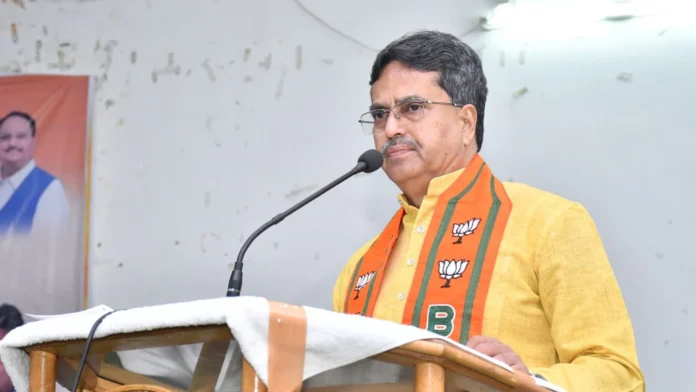Tripura is set to witness a major cultural transformation as the state government initiates the development of a cultural hub with financial assistance from the Ministry of Development of North Eastern Region (DoNER). The proposed hub, backed by a substantial fund of ₹32.5 crore, aims to preserve and promote the state’s rich and diverse cultural traditions. Authorities have confirmed that the project will feature modern facilities to support local artists while also serving as a magnet for cultural tourism.
The Department of Information and Cultural Affairs (ICA) in Tripura has taken the lead in implementing the project, which it plans to complete in phases. Officials have identified a suitable plot in Agartala, the state capital, to house the upcoming hub. Construction activities will begin in the coming months, following the completion of the design and planning stages. Architects and cultural consultants have already begun consultations to ensure that the structure reflects Tripura’s indigenous identity while incorporating modern elements.
The Tripura government has described the project as a long-overdue investment in the state’s cultural infrastructure. For years, local artists and performers have lacked proper platforms to showcase their talent, and the government believes that this cultural hub will fill that void. The state plans to equip the facility with an auditorium, exhibition galleries, rehearsal rooms, digital archives, and training centers. These additions will allow artists to develop their skills, organize performances, and preserve traditional art forms.
Local communities have welcomed the move, viewing it as a significant step toward revitalizing cultural pride and ensuring the survival of endangered traditions. The initiative will benefit folk musicians, traditional dancers, handloom weavers, visual artists, and young creators who have long struggled to find opportunities and support. Cultural activists in the region have pointed out that several native art forms are on the brink of extinction due to a lack of institutional backing. The cultural hub, they believe, will reverse this trend.
Tripura Chief Minister Manik Saha has expressed optimism about the project, stating that the cultural hub will position the state as a vibrant destination on India’s cultural map. He has praised the central government and DoNER Ministry for recognizing the potential of the state and supporting the project with a significant financial grant. He believes the hub will not only uplift local art but also boost tourism, generate employment, and contribute to the economy.
Tourism officials have begun strategizing on how to integrate the hub into Tripura’s broader travel circuit. They plan to include cultural performances, art festivals, and educational workshops as part of new tourism packages. The government is also considering partnerships with private tour operators and educational institutions to maximize the hub’s impact. With proper marketing, officials hope the hub can attract visitors from across India and abroad.
Cultural experts involved in the planning process have emphasized the importance of inclusivity. They are working closely with tribal councils and grassroots organizations to ensure that all of Tripura’s ethnic and linguistic communities find representation in the hub’s activities. By doing so, they aim to foster unity and cross-cultural understanding through shared creative experiences.
Educational institutions in Tripura have expressed interest in collaborating with the cultural hub. They see it as a platform where students can gain practical exposure to the arts and participate in cultural exchanges. Plans are underway to develop curriculum-based partnerships, internships, and artist-in-residence programs that can create a bridge between academia and the arts sector.
As the groundwork for the cultural hub begins, the Tripura government has promised transparency and timely execution of the project. Regular monitoring committees will oversee the progress and ensure quality implementation. If the project meets its intended goals, it could serve as a model for other Northeastern states aiming to preserve their cultural identities while embracing modernity.
The Tripura government has also announced its intention to ensure that the cultural hub serves as an inclusive space for youth empowerment. Authorities will reserve slots within the facility for young talent to train under seasoned artists. By offering scholarships, grants, and mentorship programs, the state hopes to encourage a new generation of cultural ambassadors who can carry forward Tripura’s legacy both nationally and internationally.
Officials are also exploring digital innovation as a key component of the hub. The upcoming center will house a dedicated digital archive that will store rare manuscripts, audio-visual recordings, and photographs documenting the state’s folk history and artistic milestones. This digitization effort will allow global access to Tripura’s cultural treasures and will support academic research, cultural exchange programs, and content creation by artists and scholars.
In addition, the cultural hub will emphasize eco-friendly architecture and sustainability. The project team has committed to using local materials and energy-efficient designs to minimize environmental impact. The site will feature green landscaping, rainwater harvesting, and waste management systems. These elements will reflect Tripura’s harmony with nature and align with the broader goals of sustainable development in the Northeast region.
The government has promised to engage civil society, artists’ unions, and cultural stakeholders at every stage of the project. Officials have begun hosting consultation meetings and workshops to gather input from the people who will ultimately use the facility. These collaborative sessions will help shape the programming and policies of the hub, ensuring it stays responsive to the evolving needs of the cultural community.
Once completed, the Tripura Cultural Hub will stand as a landmark symbolizing the fusion of tradition and modernity. It will provide a permanent, accessible, and dignified home for Tripura’s artists while opening new avenues for cultural diplomacy, creativity, and economic opportunity. Through this project, Tripura aims to remind the world that art is not just a celebration of the past—it is also a bridge to the future.

